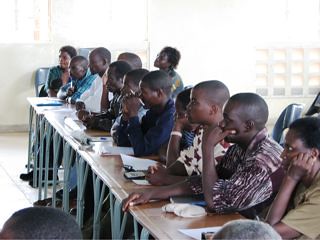Partners in Health now In Malawi
 Partners in Health, the Haitian organization which pioneered community based treatment of HIV/AIDS in low resource settings, is now operating in a third African country, Malawi.
Partners in Health, the Haitian organization which pioneered community based treatment of HIV/AIDS in low resource settings, is now operating in a third African country, Malawi.
While a Peace Corps volunteer, several African Ministers of Health came to PIH to learn how to establish such programs. Such programs were derided by senior government officials who claimed that they would never work as "poor people can't keep time". But the programs did work, and compliance was higher than the United States.
After, the same naysayers said that the programs could not be replicated. Even people passionately devoted to HIV/AIDS related issues told me this. But now PIH has replicated its program in three different low resource African countries with the support of donors such as the Clinton Foundation. Haiti is, in many ways, an orphaned African country. It gives me great pleasure to see that Haitians are teaching Africans what they have learned.
Those who doubted PIH will now undoubtedly say these programs aren't sustainable. We'll see. PIH continues to go strong in Haiti despite increasing demands placed on their facilities each year. Without a doubt, communities in its catchment area have stepped up and taken an active role in disease prevention and health promotion.
I also have no doubt that the health activities of Project Medishare, PIH, and local groups have greatly contributed to civil society in the province of Thomonde where I lived as a peace corps volunteer. The community is better organized and has worked through some major conflicts in non-violent, peaceful ways.
Take a look at Partners in Health at www.pih.org. You may also be seeing its partner for the province of Thomonde www.projectmedishare.org.
Next time someone tells you nothing works in Haiti, kindly point out to them the important role the country has played and continues to play in HIV/AIDS.
PIH launches new project in Malawi
Add a third African country to the list of places where PIH is working to provide comprehensive, community-based health care in the face of devastating epidemics of AIDS, infant and maternal mortality, and poverty.
In January, PIH launched its newest project, located in Neno, Malawi – an impoverished rural area in one of Africa’s poorest and most densely populated countries, with an HIV infection rate among adults of more than 14 percent.
Working in partnership with the Clinton-Hunter Development Initiative (CHDI), the PIH team arrived on the ground in late January and set to work immediately. By mid-February, PIH doctors were working with Malawian nurses who had staffed the hospital prior to our arrival to provide care for more than 100 patients a day and treat 129 HIV patients with antiretroviral therapy.
Construction has already begun on hospital renovation and ground will be broken soon for a new district hospital and additional staff housing. Plans are underway to train and hire community health workers to begin implementing PIH’s accompagnateur model of community-based care.
The PIH team in Malawi draws on the experience and solidarity of our projects in Haiti and Rwanda. Country Director Keith Joseph has worked with PIH for 12 years, mainly in Haiti, Peru, and Lesotho. He has been joined by Innocent Manishimwe, a Rwandan who played a leading role in launching Inshuti Mu Buzima. Innocent has taken charge of setting up laboratory facilities for PIH/CHDI in Neno. By the end of February, he had a preliminary lab with basic services up and running.
Doctors Brian Bramson and Kristine Torjesen have joined PIH in Malawi, bringing with them their three sons and several years of experience working in Malawi and Laos. Several members of the CHDI team have been indispensable in their support of PIH’s activities, including Cassia van der Hoof Holstein, Brad Barkin, Sophie Weirich, Tyler Denton, and Ellie Feinglass.
Reinforcements are on the way. In early March, Dr. Renard Cruff will arrive from Haiti to work for a month. Dr. Cruff has served most recently as Program Director at Zanmi Lasante’s Thomond site, directing the care of hundreds of HIV-positive patients. In April, project manager Jenna LeMieux and physician Jon Crocker will join the team.
Bryan
Add new comment